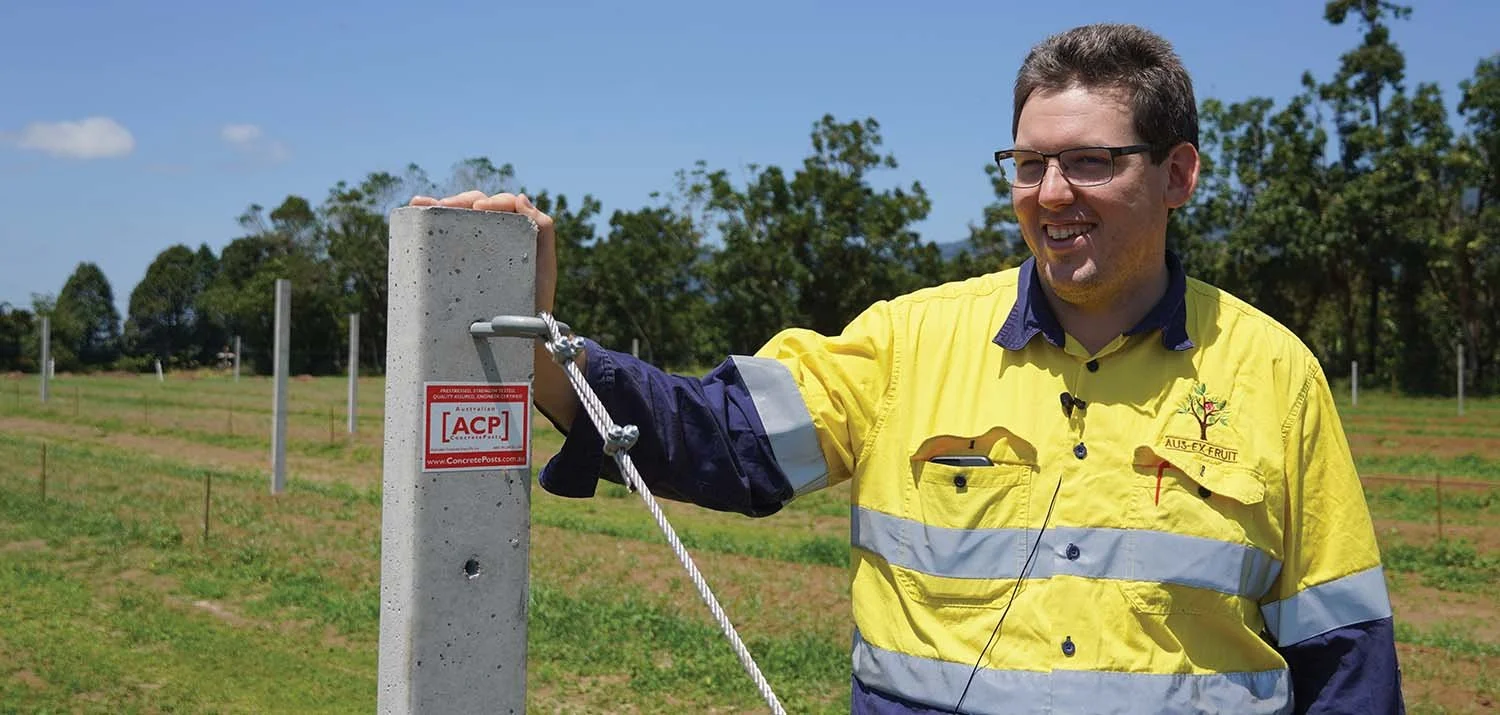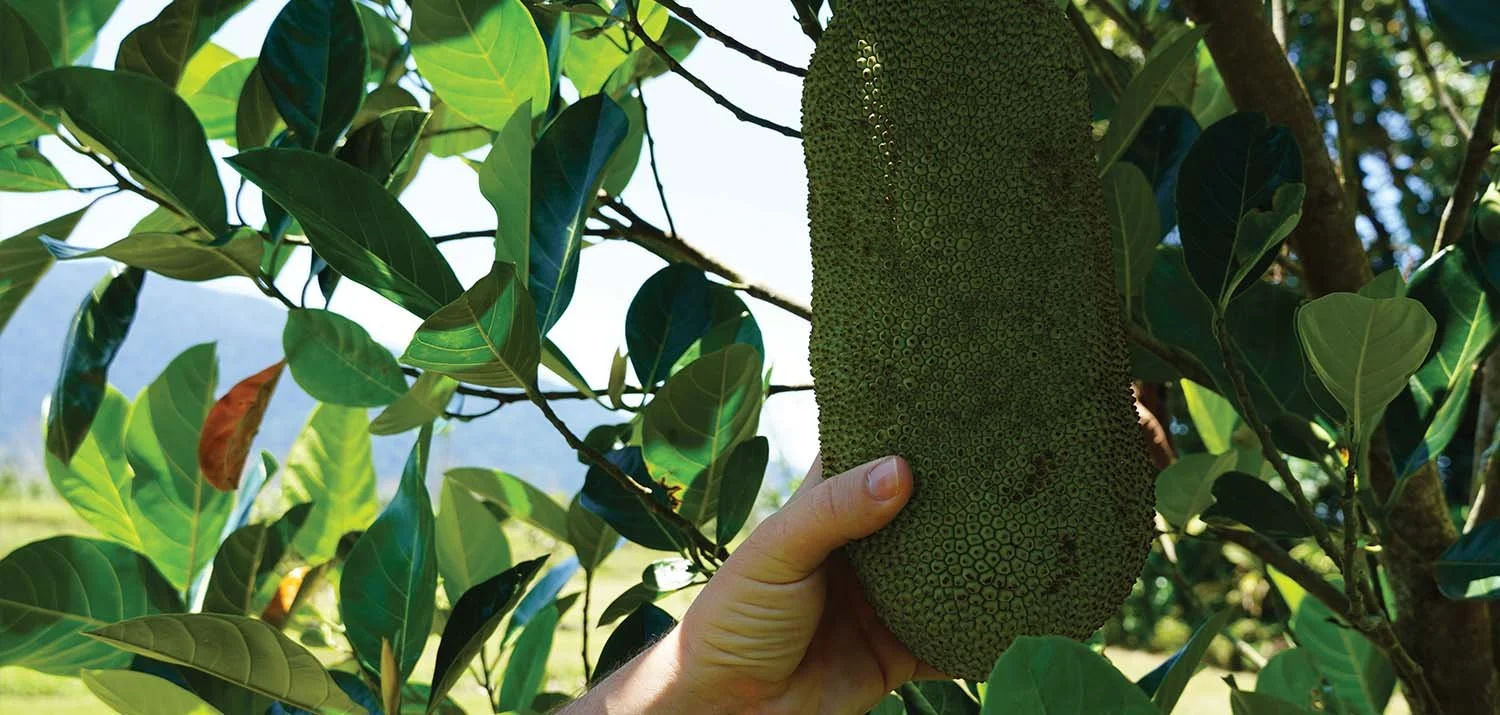The future is bright Building a resilient exotic tropical fruit industry
Bellenden Ker exotic tropical fruit grower, Josh Maunder is forging a new direction for the industry investigating improved methods of production centered around cyclone resilience, production capacity and profitability.
The third-generation farmer joined his wife’s family farm, Zappala Tropicals in 2014 where he now grows rambutans, jackfruit and durian alongside his father-in-law Alan Zappala
Fruit grown on the farm is sold to the domestic market with Josh saying they often struggle to keep up with demand.
“We currently supply the Sydney and Perth central markets but also have demand from other outlets in Brisbane, Melbourne, Adelaide and Newcastle,” he said.
“We focus on producing premium A-grade fruit as our point of difference and that has really paid off.”
In June 2020, Josh and his wife, Lisa officially launched Aus-Ex Fruit a sister company to Zappala Tropicals. While the two businesses are operating independently, they share resources such as equipment and staff.
“Over the next few years, we’re looking to really scale up Aus-Ex Fruit with plans to have 900 rambutans, 1000 jackfruit and 1000 durian trees planted,” Josh said.
“For me I love the idea of farming, but I always approach it as a business. Everything is accountable and transparent. That’s how we are approaching Aus-Ex Fruit – it is an asset so for whatever reason if we needed too, we could sell it or lease it, we have those options.”
Josh said the biggest thing affecting rambutan production is weather as they need a period of up to eight weeks of proper dry weather for floral initiation to commence. This can be quite an achievement when you live in the wet tropics and average three-to-four meters of rainfall every year.
“We’ve been very strategic in the development of Aus-Ex Fruit’s blocks planting into sandy loam soil as opposed to the traditional reds and volcanic soils, so we can drain water off the whole paddock easily,” Josh said.
“We are also reinvigorating traditionally run-down waterways and maintaining vegetation buffers as part of our Hort360 Reef Certification responsibilities.
“The shape, structure and height of our trees are also being managed so they don’t get as big, and they don’t build up as much energy (carbohydrate) reserves in the root systems.
“With these improvements we believe we can halve the dry weather required for floral initiation down from eight weeks to four.
“The key to the Aus-Ex Fruit system is working with the climate, topography and making the most of the opportunities whilst managing the risks.”
Josh said demand for pollinators over the past couple of years has increased significantly attributing it to a decline in available hives and bee numbers.
“We are fortunate in our location that we have many different native pollinators, but we still bring in bees to aid our rambutan crop,” Josh said.
“It used to be very easy to access pollination services but demand for bees has gone through the roof the past couple years. I think a lot of that was the bushfires a few years back.
“Where we use to be able to get the service for free, we’re paying around $25 per hive per month. And that’s us getting it on a good price as we are an off-season crop. It’s something that’s becoming a bit concerning.”
Josh said he was currently investigating options for keeping bees on farm including looking into Native Bees.
Developing the next generation production system
Across northern Australia traditional low-density horticultural production systems continue to be highly susceptible to tropical cyclones leading to not only stagnated sectoral growth but missed economic opportunities.
Under a recently funded Cooperative Research Centre for Developing Northern Australia (CRCNA) project being led by the Queensland Department of Agriculture and Fisheries (QDAF), Zappala Tropicals will be working along-side QDAF, the Northern Territory Department of Industry, Tourism and Trade (NT DITT), Western Australia Department of Primary Industries and regional development (DPIRD), Manbulloo Limited, Northern Territory Farmers Association (NT Farmers) and Growcom to develop what has been termed the next generation production system for horticultural tree crops.
Under the project a range of high-density production and trellis planting systems will be assessed for their cyclone resilience and production capacity and profitability.
“The whole concept around trialing different production systems for how we produce our trees and putting them into high density systems was developed a couple years ago,” Josh said.
“Principally the idea of the project is around the next generation production system – how do we grow trees moving forward looking at not only cyclone resilience but also return per unit.”
Josh said the project was intended to benefit the horticulture industry as a whole with the research findings applicable to any orchard production system.
“If I could get one thing out of the project it would be for growers to see a sense of opportunity,” Josh said.
“I’m always looking at what can we do to benefit and grow the industry, and if I can get to the end of the project and we’ve done it well enough that a grower that’s never grown a tree crop before looks at it and goes ‘there’s an opportunity there, I want to give that a go’, that’s what I’m looking for.”
Ground preparations have begun around the country for the project which is expected to conclude in mid-2024.
“The trellis we’re constructing is a single post, multi-wire support system. The tree is planted and grown onto horizontal wires in a single frame structure. So very open,” Josh said.
“Growers in the wet tropics have used the V or tatura trellis system which is a very dense system. And we know from feedback that while it is a fairly good system it does have its challenges with the constant need for pruning and tree management.
“At the end of the day, trees in the wet tropics just want to grow, so we needed something that was a little bit more flexible in terms of the management system.
“What we did was look at it and go how can we get the benefit of a supported system but also have opportunity for mechanical pruning.”
Exotic tropical fruit industry focusses on the future
Australia’s exotic tropical fruit industry is making a name for itself with increasing consumer demand leading to a shift in major supermarkets stocking the exotic fruit lines.
Predominantly grown in northern Australia the exotic tropical fruit industry encompasses over 60 crops. The industry is going from strength to strength with many growers planning to double or even triple tree plantings over the next five to 10 years.
As the industry continues to grow, it faces a new and complex challenge – the challenge of developing a multi-crop industry body.
“We’ve been doing some work in the background which has largely been led by the Northern Territory Farmers Association (NT Farmers),” Josh said.
“It’s unlikely that an industry body could sustainably represent 60 plus crops, so we’ve been working to bring that number down to a small number crop with high value and growth potential.”
A new AgriFutures Australia report, that at the time of printing was close to being released, has examined four high value exotic tropical crops – rambutan, durian, jackfruit and dragon fruit – and what the key R&D priorities are for the crops.
“Of the four crops, dragon fruit is represented by its own industry body so that leaves us with the other three,” Josh said.
“If we can get commercial growers of these three crops together, we’ve got an opportunity to look at a proper industry body.”
Josh said this will not be the first time the exotic fruit industry has gone down the path of establishing a representative body, but that lessons have been learnt from the past.
“This time around we are being very strategic in terms of what are the crops we’re going to take with us and what are we really going to put our attention too,” he said.
Bringing global insights home
Earlier this year Josh joined the ranks as a Nuffield Scholar. This prestigious scholarship program has been in operation for 70 years and provides scholars with the opportunity to travel and study an agricultural topic of choice.
Through the scholarship program, Josh is investigating how the horticulture sector can adapt to rapidly changing climatic conditions through more resilient production methods.
“Whether you believe it is attributed to climate change or not, it doesn’t matter anymore as the stark reality is that global weather patterns are changing,” Josh said.
“Patterns of weather we could rely on 20 or 30 years ago in terms of a wet summer and a generally dry winter have gone out the window in the last five years.
“Some farmers are taking the attitude of ‘we’re just taking it day by day’, but if you’re running a horticultural business that’s relying on a set period of time for something to happen be it rain for fruit filling or no rain for flowing, that is an incredible risk.
“You can control risk in everything, but you cannot control the weather. This is going to be one of the most critical things in farming over the next decade.”
Josh said there were some initial concerns about participating in a scholarship program designed around global travel and partnerships but said full credit must be given to Nuffield Australia and Nuffield International who have gone above and beyond to make the experience as engaging a possible.
“Firstly, it has been a fantastic experience and I am very grateful to not only Nuffield as an organisation but also my sponsor Westpac Agribusiness,” Josh said.
“Obviously a scholarship that is designed around global travel is very difficult to do in the era of COVID, but Nuffield has done a fantastic job bringing the world to us.
“We recently participated in a series of week-long tours where we visited different countries and farms virtually. It was a really great opportunity and generated some meaningful discussion.”
Josh said the scholarship cohort is currently focused on developing their research topics and writing their reports. While the international travel and investigation would normally contribute to the report writing, Josh said it was entirely possible that there would be a generation of scholars that will have written their reports without having done the full travel program.
For Josh the idea of post-scholarship travel would be an amazing opportunity with Taiwan, Japan and the United States on his list of places to visit.
“Taiwan is of great interest to me. They’re a small continent that’s sea-locked but they produce so much food using high-density growing and production systems. It’s also one of those places that can get a typhoon any day of the year, so they’ve obviously developed systems that work there,” Josh said.
“I would also like to get over to the United States and visit the big citrus growing regions in Florida where they experience fairly extensive hurricane activity.”



